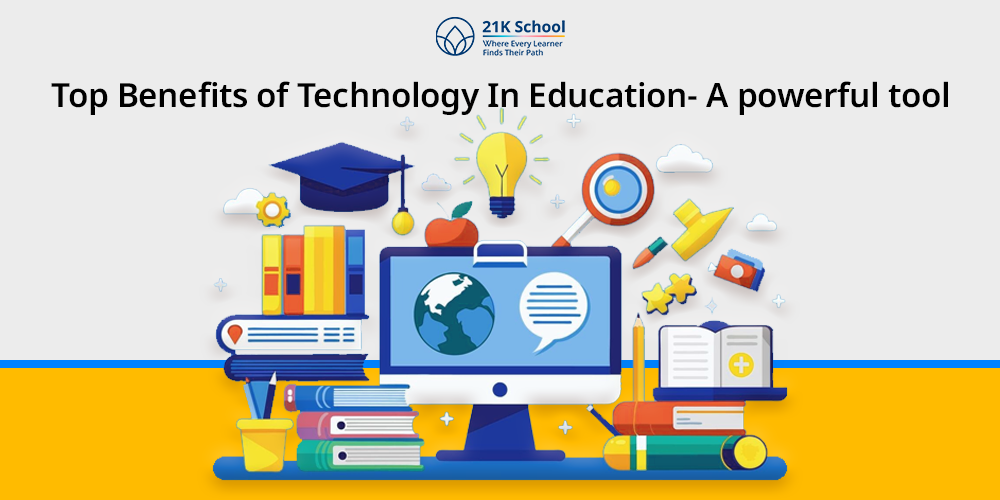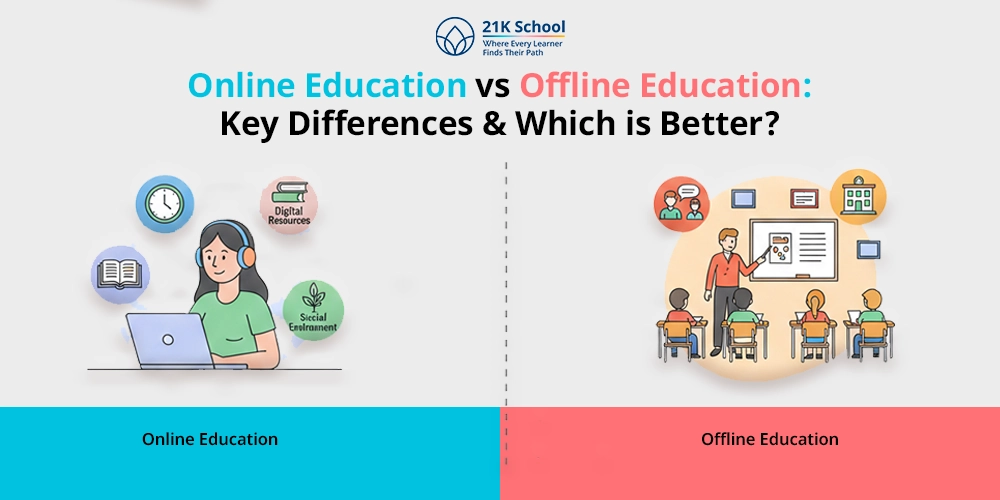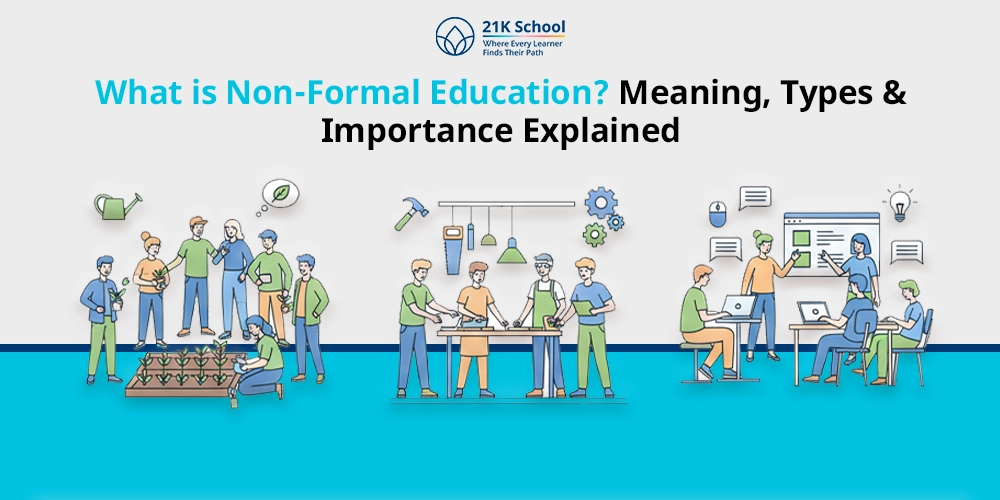
In the 21st century, education and learning has evolved with rapid growth. The usage of technology has come into a picture with its wide advancement.
The education has been integrated with the technology i.e. educational resources has been inaugurated with digital source and tools.
Technology in education is more than usage of digital tools and applications. Due to technology in education, the access and spread of information is worldwide and in your palm, now.
The paradigm shift has now changed from blackboard to smart classes. You can explore more about the contribution of technology in education .
Here is a complete overview and detailed information on technology in education, with its examples and benefits. Go through it and explore all about advantages and disadvantages of technology in education .
Contents
- What is Technology in Education?
- 12 Benefits of Technology in Education for Smart Learning
- 1. Accessibility in education
- 2. Personalized learning
- 3. Engagement and involvement in learning
- 4. Collaborative learning
- 5. Immediate learner feedback
- 6. Cost effectiveness
- 7. Inclusive learning
- 8. Digital literacy
- 9. Flexibility in learning
- 10. Access to information
- 11. Digital learning environment
- 12. Increased efficiency in learning
- Examples of Technology in Education
- Final Thoughts
What is Technology in Education?
Technology in education means inclusion of technology, digital tools, applications and online software to teaching, learning, and its administration.
It inserts (Information and communication technology) ICT in education . It facilitates the process of teaching and learning, requiring enhancement of certain skills.
Technology in education has gone beyond usage of digital tools and software. It has become extensive, inclusive and personalised in its learning. Educators or teachers can adjust learning techniques, method, styles, formates, etc. as per students requirements.
Modern education bridges the educational gaps and meets the requirements of the digital world. It demands to use technology effectively in order to enhance educational learning.
Learn importance of technology in education .
12 Benefits of Technology in Education for Smart Learning
Technology is a powerful tool required in the process of teaching and learning. The integration of technology has eased the delivery of learning and information. Know how technology can support students success .
Here are some key benefits of technology in education.
1. Accessibility in education
Technology has widened the access of education across the world. Due to barriers like, place and time, education was restricted and selectively available.
But now- a- days, with the help of technology and internet connection, learning is easily accessible to even remote places. The rate of education has risen over the years, accessible to almost all backgrounds.
2. Personalized learning
Personalised learning refers to learning’s styles that can be customised as per students needs and availability, interest and requirements.
For example, individuals learning interest and choice, learned style, students comfort and availability. It enables change and adaptability of learning with options to blend and fit for all.
3. Engagement and involvement in learning
Technology in education involves engagement and involvement of teachers and learners. Digital tools, interactive applications and software use technology with tools and styles. Such a process boosts engagement and involvement of learners.
For example, Smart board, 3D animation, visual learning, engaging games and play.
4. Collaborative learning
Technology in education includes different collaborative tools and methods that reinforce learning. It opens various new dimensions and perspectives to education. Explore how technology impacts collaboration among students in group projects .
For example, Smartboards, webinars, workshops and learning platforms.
5. Immediate learner feedback
Technology makes quick options for immediate and personalised feedback. Educators or teachers can assess students’ learning and performance, and send feedback.
For example, feedback after, E- learning assessment, online tests, analytical tools for learning, etc.
6. Cost effectiveness
Mixing technology into education can be cost- effective and decrease numerous expenses. It gives access to online learning, which has low- cost expenses and saves resources.
For example, the cost of infrastructure, other energy resources, and administration expenses are cut. Virtual classrooms, remote learning, free digital resources and scalable automation cost, decrease expenses.
7. Inclusive learning
Technology plays a vital role in inclusive learning, making it open for diverse learners from all around. Regardless of the learner’s background, location, ability, disability, learning is provided to all. Role of technology in education , with the help of digital and interactive tools fosters inclusive learning.
For example, technology facilitating education for individual personalised learning as per their requirements, remote students, economically weak section, working, etc.
8. Digital literacy
Digital literacy refers to effective utilisation of technology for equipping students with skills. Through digital technology in education , it initiates personalised learning and styles. It spreads access to information, collaboration, communication and digital safety.
For example, students can navigate different interactive tools and online resources to create multimedia design and presentations.
9. Flexibility in learning
Technology allows students to enjoy flexible learning environments. It has options for personalized learning, flexible timings and learning from anywhere in the world. Diverse learners from all geographical places have an option to learn.
For example, personalised learning for students who require special learning, extra classes, hybrid learning, etc.
10. Access to information
Technology brings access to information through various different sources, from all around the world. It bridges the gap such as distance, remote places, diverse backgrounds and financial barriers.
For example, websites and internet access, interactive sessions, e- book, e- libraries, tutorials, videos, and others.
11. Digital learning environment
Digital or virtual learning environment is an online platform that involves the process of teaching and learning. In digital learning platforms, learning happens through virtual mode in virtual learning environments.
For example, through learning management system, i.e. Canva and Google classroom. Video conferencing platforms, like google meet, zoom and Microsoft.
12. Increased efficiency in learning
Technology initiates the learning efficiency and process. This is through improving communication, sharing platforms, materials, immediate feedback and personalised learnings.
For example, technology quickens the teaching and learning process through automatic updates, ready-made templates, designed teaching and learning platforms.
Explore scope of educational technology .
Examples of Technology in Education
1. E- learning
With technology, education has shifted to different e-learning platforms , such as Google, Coursera, Microsoft, Zoom, Whiteboards, online learning, websites, etc.
2. Smart board
Modern education has replaced the old way of teaching to digital smart boards. With the help of technology, smart boards can showcase and insert images, pictures, charts, animation, tables and lessons.
3. Projector
Projectors are used in inserting visual effects to classroom learning such as usage of images, pictures, educational video, animation and presentation.
4. Video conferencing
Video conferencing support classes on platforms such as, zoom, google, microsoft, personalised classes facilitates learning with teaching, even in remote areas.
5. Educational applications
Educational applications such as Google Classroom, Microsoft, and personalised applications of institutions help students to learn. Students can learn through classes, quizzes, assessments and tests.
Final Thoughts
Technology has shaped the scenario of education and revolutionised it, from time to time. With many features of technology in education, it has led to effective, interactive and engaging learning. Technological advancements, interactive and collaborative tools have fastened the education system.
Schools and tuitions have evolved with online learning platforms and digital learning environments. Technology has brought people closer, interactive, engaging and dynamic. Learn more on impact of technology on education .
Educators and learners can now switch to their ease methods, pace and availability of learning. It has not just facilitated apps, tools and applications but also empowered students from all over the world.



